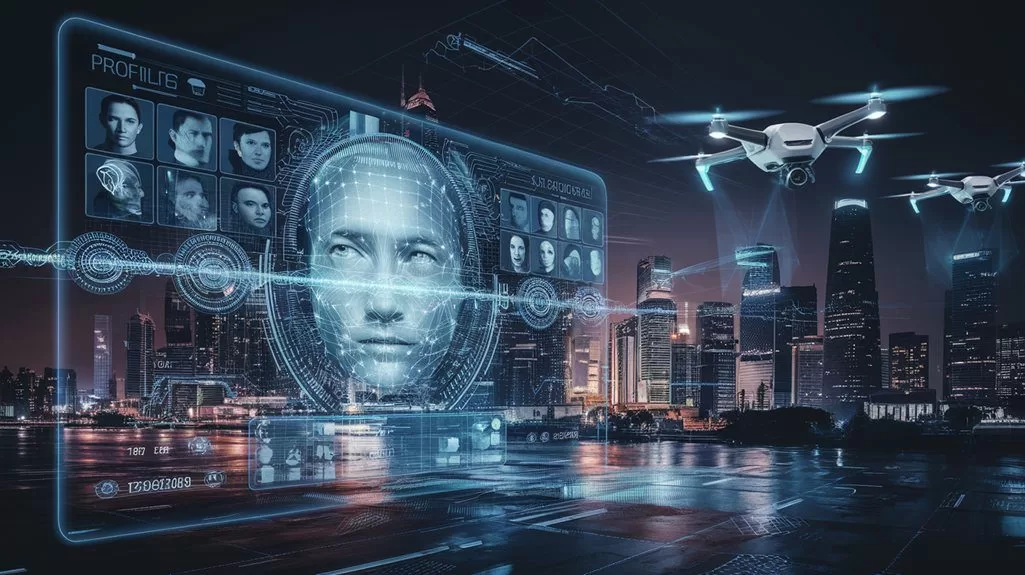AI and biometrics revolutionize security, enhancing authentication and threat response. But at what cost? Privacy and ethical concerns loom large. Data breaches pose significant threats. The idea of dehumanizing individuals into mere numbers raises eyebrows. Transparency? Often lacking. Yet AI's efficiency in reducing false positives is undeniable. Some regulations struggle to keep pace with innovation. The balance between security and privacy remains tricky. Intrigued by these contradictions? Dive deeper into the tech vanguard.
Key Takeaways
- AI enhances biometric security, but ethical concerns about privacy and data misuse persist.
- Continuous authentication through AI reduces unauthorized access, yet raises surveillance and consent issues.
- Regulatory challenges struggle to keep pace, risking innovation and complicating compliance with privacy standards.
- Data breaches of biometric databases could lead to severe identity theft risks and public distrust.
- AI-driven security advancements improve breach detection, but balancing privacy costs remains a critical debate.

The dance of AI and biometrics—an intriguing love-hate saga. They twirl together, promising precision and security. AI steps in, enhancing biometric accuracy and reliability, reducing those pesky false positives. It plays the vigilant guard, using adaptive algorithms to thwart cyber threats. Continuous authentication? Check. AI guarantees unauthorized access is kept at bay. It even automates privacy regulation compliance. How considerate.
Yet, the tango isn't all rosy. Biometric ethics and surveillance implications cast long shadows. Data immutability is a real stickler—once compromised, biometric data can't just be changed like a password. And those surveillance risks? Big Brother vibes are real when biometrics get involved in unauthorized monitoring. Function creep lurks, turning data collection into a free-for-all of unintended uses. Transparency? Often absent. Users remain in the dark, unsure of how their data is stored or used. Legal challenges abound, with questions of consent and privacy knocking at the door. As the Biometrics Institute emphasizes, understanding the relationship between biometrics and AI is crucial for steering responsible innovation.
Biometric ethics cast shadows; data's immutability and surveillance risks echo Big Brother's watchful eye.
Regulation attempts to referee this complex dance. But it stumbles. Ambiguity in regulations sometimes overreaches, potentially stifling innovation. There's a call for clarity, a need for consensus on definitions and standards. Liability frameworks? A tangled web, adding layers of complexity. Future regulations loom, fueled by the rising priority of data privacy. Machine learning plays a significant role in automating repetitive tasks, bolstering cybersecurity operations through enhanced efficiency.
Privacy concerns loom large. Data breaches threaten biometric databases, dangling the risk of identity theft. Public perception swings wildly, shaped by media portrayals that paint biometrics and AI as either saviors or villains. Secondary information disclosure is a sneaky menace, potentially revealing unintended details about individuals. Dehumanization concerns whisper in the background, reducing people to mere templates can feel…cold. Consent? A slippery slope when covert collection and mandatory use rear their heads.
AI wears another hat, boosting security measures. It optimizes encryption, guaranteeing biometric data is securely stored. Breach detection? AI's got that covered, accelerating response to incidents. Adaptive threat response keeps systems learning and evolving. Compliance automation is another feather in its cap, ticking off privacy regulation boxes. And let's not forget enhanced authentication, with AI supporting multi-modal biometric systems for fortified security. As privacy concerns arise from how biometric data is stored and managed, breaches of biometric databases can have more detrimental effects than password theft, emphasizing the need for robust protection mechanisms.
In this intricate dance, the question remains: Are these security advancements worth the cost? As AI and biometrics twirl, the audience watches, captivated and wary. The stakes are high, the benefits tantalizing, yet the pitfalls are undeniable. The saga continues, as complex as ever.
Final Thoughts
AI and biometrics promise enhanced security, yet privacy concerns loom large. Sure, accessing your phone with a glance is cool, but at what cost? Data breaches and surveillance risks are real. Companies reassure us, but trust is flimsy. The convenience of facial recognition versus the nightmare of identity theft—a tough call. It's a tech tug-of-war: innovation versus privacy. So, are these advancements worth it? Maybe. Maybe not. Depends on how much you're willing to sacrifice.
References
- https://www.upguard.com/blog/the-future-of-biometric-data-protection
- https://www.biometricsinstitute.org/the-complex-relationship-between-biometrics-and-artificial-intelligence/
- https://www.identity.com/privacy-concerns-with-biometric-data-collection/
- https://aiineyecare.com/the-battle-for-privacy-in-the-world-of-artificial-intelligence/
- https://ovic.vic.gov.au/privacy/resources-for-organisations/biometrics-and-privacy-issues-and-challenges/








